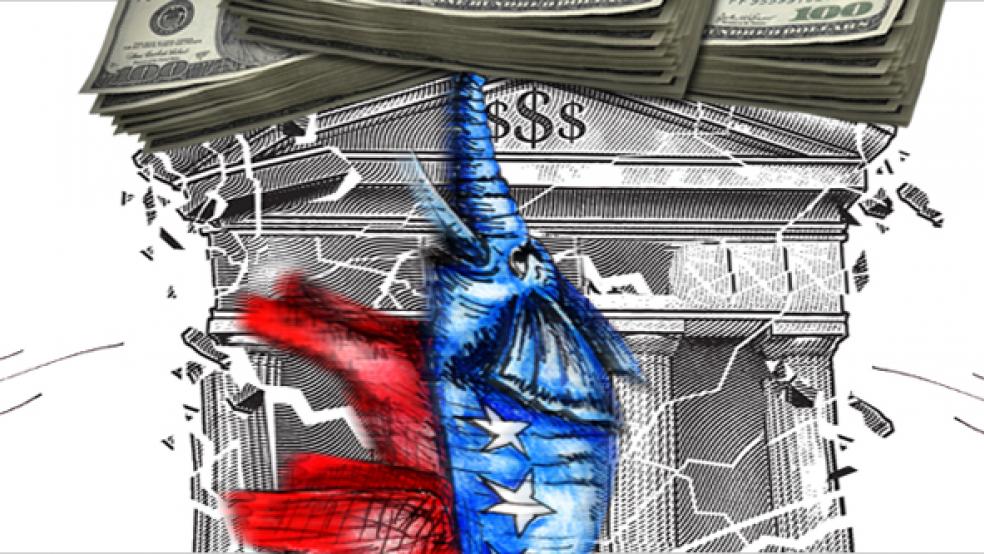
Contrary to popular belief, Republicans don’t hate budget deficits. On the contrary, they love them. When they occur on the Democrats’ watch, they provide Republicans with endless talking points on how they are bankrupting the country and will inevitably lead to high inflation and interest rates. This is good for Republicans, politically, because rich people, the elderly and other core elements of the Republican coalition get scared and give lots of money to Republican candidates.
In office, of course, Republicans care nothing about the deficit. They cut taxes willy-nilly, sharply raise defense spending and start wars if necessary to justify it, create huge numbers of pork barrel projects, and enact massive new entitlement programs such as Medicare Part D, all while asserting that they are the party of fiscal responsibility.
When a Democratic administration such as that of Bill Clinton comes along that actually is fiscally responsible, Republicans change the subject and talk about something else. As at least some of us remember, Clinton inherited a budget deficit of 4.7 percent of the gross domestic product from the George H.W. Bush administration in 1992. By the year 2000, Clinton had turned that deficit into a budget surplus of 2.4 percent of GDP.
I don’t recall a single Republican ever congratulating Clinton for his amazing fiscal achievement. All I remember are the pathetic attempts by Republicans to take credit for something they had absolutely nothing to do with. Every single Republican in Congress voted against the 1993 budget deal, which raised taxes, imposed severe caps on spending, and laid the foundation of the surpluses.
During the 2000 campaign, Republican George W. Bush ran against the budget surplus. He said it was dangerous because Congress might spend it. As Bush’s principal budget adviser, Hoover Institution economist John Cogan, put it during the campaign, “Anyone familiar with history has to be dubious about Congress’s ability to keep its mitts off the surplus and put it to debt reduction.”
This was a ludicrous argument because Bush could have simply vetoed any effort to spend the surplus. The argument became even more ludicrous when Bush brought in Republican control of the House and Senate with his election. The only way the surplus could be spent is if Republicans allowed it.
After talking office, Bush shifted the argument away from the danger of the surplus being spent to the idea that it represented unnecessary taxation. As he told a joint session of Congress on February 27, 2001, “You see, the growing surplus exists because taxes are too high and government is charging more than it needs. The people of America have been overcharged, and on their behalf, I am here asking for a refund.”
As we know, Republicans quickly enacted a large tax cut, including a gimmicky tax rebate that even Bush’s own economic advisers told him was economically worthless. And it was; subsequent research showed that it had no stimulative effect whatsoever. So they did another rebate in 2008 that was also a failure.
Despite Republican promises of faster economic growth, the economy languished, requiring—you guessed it—more tax cuts. There were 7 major tax cuts during Bush’s presidency that collectively reduced revenues by 2.3 percent of GDP; that is, they increased the budget deficit by 2.3 percent of GDP.
Republicans simply ignore the effects of tax cuts on the deficit; they just pretend that they have no effect or use magical thinking to assert that revenues didn’t actually go down. But in fact, federal revenues fell from 20.6 percent of GDP in 2000 to 17.6 percent of GDP by 2008. There is no evidence whatsoever that the Bush tax cuts did anything except reduce revenues and increase the deficit dollar-for-dollar.
And because the Bush tax cuts continued well after he left office, they were responsible for much of the deficits that Republicans have blamed 100 percent on the Democrats since noon on January 20, 2009. The Republican-sponsored Medicare Part D program will add about one percent of GDP to spending forever and Republican wars in Iraq and Afghanistan have cost at least $1 trillion thus far, with as much more that will need to be spent for decades on veterans’ benefits.
For reasons unknown to me, Democrats have always seemed reluctant to take credit for the budget surpluses under Clinton or to call out Republicans for their hypocrisy and endless lies about the cause of the deficits and utter disingenuousness about dealing with the problem seriously. They routinely torpedo any deficit reduction plan with so much as a penny of higher taxes and always include huge tax cuts for the rich in their own budget plans.
Despite their fecklessness and total lack of seriousness on the deficit for the last 5 years, many Americans nevertheless believe the GOP is the party of fiscal responsibility and Republican candidates have benefited from this false perception.
But there is a grave danger on the horizon—the danger of a deficit declining so rapidly it threatens the economy. If people perceive that a sharply declining budget deficit is the cause of an economic slowdown, then the Republican budgetary view—which has insisted for 5 years that budget cuts are stimulative—may be thoroughly discredited.
Worse still, we may achieve a budget surplus anyway. So serious is this possibility that Republican strategists such as James Pethokoukis and Reihan Salam are warning about the danger.
The evaporation of their major issue may explain why Republicans are doubling-down on the nonexistent Benghazi “scandal” since they seem to have nothing else to talk about, with unemployment trending downward and the stock market booming. It’s worth remembering that Republican economist Larry Kudlow used to trumpet every pathetic upturn in the stock market during the Bush years as proof positive that his policies were working. Today, he completely ignores any connection between Obama’s policies and the record stock market.
If the deficit in fact disappears, it will be much harder for Republicans to sustain their budgetary strategy. That will create a crisis that Republicans will have enormous difficulty coping with.






